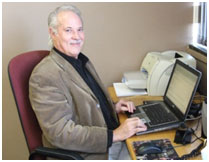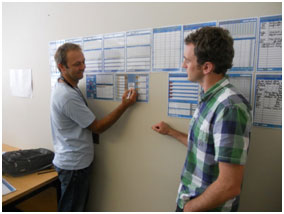History: PRASA Engineering Research Chair
? The Passenger Rail Association of South Africa (PRASA) approached the
Department of Industrial Engineering in 2009 with the request to assist them
with solving recurring problems. Because the root causes of the problems were
then seen to be of a much more complex nature, Prof Neels Fourie of the
Industrial Engineering department and PRASA/Metrorail
conceptualised the creation of an academic research chair. From the onset, it
was visualised that this Chair will assist and support PRASA/Metrorail in their
quest for solutions and to become the preferred passenger rail agency in South
Africa. After many discussions and planning sessions, an agreement was signed
for the establishment of the PRASA Engineering Research Chair in the Engineering faculty from 2011, with Prof Fourie as the incumbent. A Senior as well a Junior
Research Engineer have subsequently been appointed to assist in carrying out
the projects.
The Passenger Rail Association of South Africa (PRASA) approached the
Department of Industrial Engineering in 2009 with the request to assist them
with solving recurring problems. Because the root causes of the problems were
then seen to be of a much more complex nature, Prof Neels Fourie of the
Industrial Engineering department and PRASA/Metrorail
conceptualised the creation of an academic research chair. From the onset, it
was visualised that this Chair will assist and support PRASA/Metrorail in their
quest for solutions and to become the preferred passenger rail agency in South
Africa. After many discussions and planning sessions, an agreement was signed
for the establishment of the PRASA Engineering Research Chair in the Engineering faculty from 2011, with Prof Fourie as the incumbent. A Senior as well a Junior
Research Engineer have subsequently been appointed to assist in carrying out
the projects.
 The primary goal of the PRASA Chair was to initiate and execute research into aspects of maintenance management and applicable engineering management principles best suited to the needs of PRASA/Metrorail. A training program has also been established under the umbrella of the existing Management Development Programme with the primary objective to train PRASA managers and engineers to acquire the requisite managerial and technical expertise. The PRASA Chair also administers bursaries funded by PRASA. With the establishment of the PRASA Chair, it was visualised that the following aspects will be covered by the activities of the Chair:
The primary goal of the PRASA Chair was to initiate and execute research into aspects of maintenance management and applicable engineering management principles best suited to the needs of PRASA/Metrorail. A training program has also been established under the umbrella of the existing Management Development Programme with the primary objective to train PRASA managers and engineers to acquire the requisite managerial and technical expertise. The PRASA Chair also administers bursaries funded by PRASA. With the establishment of the PRASA Chair, it was visualised that the following aspects will be covered by the activities of the Chair:
- Modern Maintenance Systems
- Business Process Modelling
- Application of Lean Thinking in PRASA
- Continuous Process Improvement Strategies
- Sustainable Training Program in PRASA
- Reliability improvement in Maintenance
At the end of 2013, the original agreement was renewed and the scope of the Chair was extended to include more engineering related solutions. This led to the appointment of an additional research engineer and the creation of a "virtual laboratory" concept. It allows the PRASA Chair free access to all the researchers and laboratories of the Faculty on a quid pro quo basis, giving the PRASA Chair more avenues to explore possible solutions.




